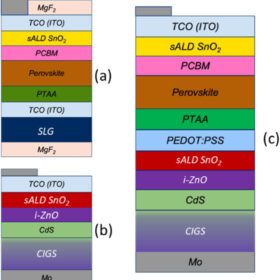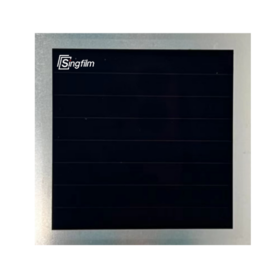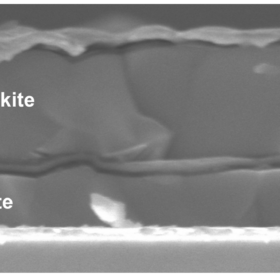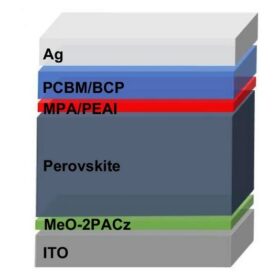Self-cleaning perovskite solar cell based on leek leaves-like film achieves 14.2% efficiency
Scientists in Finland have built a perovskite solar cell with a bio-inspired coating that reportedly improves light transmittance while providing self-cleaning properties. The film was able to improve the device efficiency by up to 6%.
Solar cell based on 2D Dion-Jacobson perovskite achieves 19.11% efficiency
Chinese researchers claim to have developed an “ultrastable” perovskite solar cell based on a two-dimensional, Dion-Jacobson phase perovskite. The device was constructed with blade coating technology and is scalable, according to its creators.
Perovskite-CIGS tandem solar cells have technical potential to achieve 26.69% efficiency
A Dutch and U.S. research team performed optical and electrical simulations to understand loss mechanisms in two terminal (2T) tandem cells based on perovskite and commercially available copper-indium-gallium-selenide (CIGS) cells, and subsequently established a roadmap to increase efficiency via four key modifications.
EneCoat to accelerate perovskite PV production
EneCoat Technologies, a Japanese solar perovskite developer, has raised JPY 5.5 billion ($35 million) from new and existing investors to finance new collaborations based on its low-temperature production process.
Scientists say concavities in perovskite films may improve solar cell stability
Hong Kong University of Science and Technology (HKUST) researchers have gained insights into perovskite microstructure. After removing grain surface concavities in the crystalline grains of perovskite, they fabricated a solar cell with improved efficiency retention under standardized thermal cycling, damp heat, and maximum-power-point tracking tests.
Singaporean startup achieves 22.6% efficiency for perovskite solar module
Singfilm Solar said the result was certified by China’s National PV Industry Measurement and Testing Center (NPVM).
All indoor PV technologies at a glance
A review of indoor PV cell technologies by an international research team delves into recent progress, characterization, and design strategies used to develop highly efficient cells. The study presents 250 commercial and laboratory devices, as well as applications and performance reporting.
All-perovskite tandem solar cell based on tin-lead perovskite achieves 27.8% efficiency
Scientists in the United States have fabricated an all-perovskite tandem solar cell that reportedly shows reduced interfacial energy loss in the cell’s top device. It was built with a hole transport layer based on a compound known as P3CT that was doped with lead iodide.
Inverted perovskite solar cell based on synergistic bimolecular interlayer achieves 25.53% efficiency
Developed by researchers in China, the inverted perovskite device purportedly achieves the smallest nonradiative recombination-induced open-circuit voltage loss reported to date. It uses a synergistic bimolecular interlayer to functionalize the perovskite interface.
Solar cell based on high-entropy hybrid perovskite achieves 25.7% efficiency
Researchers in China have built for the first time an inverted perovskite solar cell relying on a high-entropy hybrid perovskite material. The result is a device with an improved open-circuit voltage and fill factor, due to reduced non-radiative recombinations and optimized interface.










